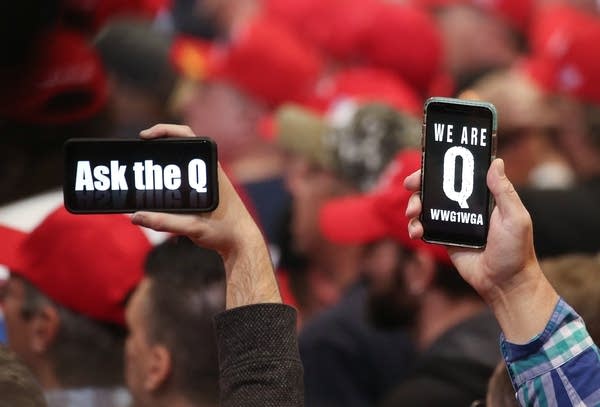Social platforms were warned about the right-wing conspiracy movement years ago. Now, they’re even winning elections.

Facebook this week removed thousands of groups, pages and accounts on Facebook and Instagram belonging to the right-wing conspiracy movement QAnon. QAnon has maybe millions of followers who believe, among other things, that a satanist cabal of pedophiles is conspiring to bring down President Donald Trump.
The movement was identified as a possible domestic terrorism threat by the FBI in 2019, but a QAnon supporter recently won a Republican primary in Georgia and Trump frequently retweets QAnon advocates’ posts. I spoke with Kevin Roose, who is following this for The New York Times. The following is an edited transcript of our conversation.

Kevin Roose: Part of the beliefs that make it seductive is the sense that there is this secret knowledge that QAnon believers think that they have access to. They are going out and doing their own research and coming to their own conclusions. QAnon believers are going in every day to these Facebook groups and these chatrooms and these YouTube comment sections, and they’re talking about new developments in the QAnon theory. I think for a lot of people, it’s become their primary form of entertainment and socializing, especially during the pandemic, when we don’t have access to many of our real-world relationships.
Molly Wood: Do you think that the Facebook and the YouTube and Twitter algorithms pushing this content actually lend, or lent, some legitimacy to it? When an algorithm just sends you a thing over and over again, even if it seems crazy at first, maybe you start thinking like, well, maybe this is a thing.
Roose: Yeah, absolutely. I think there’s also a human piece of how this is spreading. I’ve been lurking for a long time and I’ve seen them doing concerted outreach to other kinds of groups — to anti-vaccine groups, to anti-mask-wearing groups. This save-the-children movement started out as a legitimate anti-trafficking movement. QAnon seized on that and said, well, maybe if we can convince people that this global cabal is doing the trafficking, they’ll be more attracted to our theories. So they started going into groups that were talking about child exploitation, and kind of seeding QAnon content.
Wood: It starts as online conversations, but I think that the leap that a lot of people still aren’t able to make is that this ends up in the real world with really real consequences.
Roose: Yeah, I mean, we’ve seen for years now that QAnon believers are not just confining their activism to the internet, they’re going out and doing things like holding up traffic on the Hoover Dam bridge with a weapon to demand the release of some “deep state” documents. There’ve actually been murders and kidnappings committed by QAnon followers. If you are part of this movement, and you believe that there is this cabal of pedophile elites who are literally kidnapping and eating children, then why would you not go try to stop that in the real world, if you can?
Wood: What do you think might happen next, now that QAnon is winning elections and getting tacit endorsement from the president?
Roose: Well, the other day, I got curious about this, [so] I started going back and looking at some of the old coverage of the Tea Party when it first emerged during the Obama administration. And it was shockingly similar to how people are talking about QAnon now. They were saying, “This is a fringe group. They’ve got all these conspiracy theories. This is never going to be taken seriously within the Republican Party.” And then they won a bunch of races in 2010. And suddenly the Tea Party was not a fringe phenomenon. Suddenly it was this force that was pulling the Republican Party in certain directions, and that really kind of took over the Republican Party. So I think if we’re not careful, we could be seeing something very similar happen with QAnon, where they will amass political power. And even if they’re not running and winning tons of seats in Congress, they could sort of exert this force on the Republican Party that could push it in a more conspiratorial and, frankly, more violent direction.
Wood: I mean, I feel like social media is just a part of this. But is there a lesson that Facebook or Twitter or YouTube could learn here about being proactive? I mean, I get that that’s a slippery slope. It’s hard to take something seriously until it’s serious.
Roose: Yeah, but you don’t have to wait until the first person wins a congressional primary to do anything. People have been talking to these platforms and warning them about QAnon for years. There have been violent incidents for years. I think what the platforms have been slow to understand is that these groups are all interconnected. The same people who are pushing QAnon are also pushing conspiracy theories about vaccines, are also pushing conspiracy theories that are anti-Semitic and racist about Black Lives Matter. These are networks of people who often do this all day — they have a lot of energy, they have a lot of savvy about social media, and they’re exploiting these networks for their own gain. I think the platforms need to understand that this is not an isolated phenomenon. This isn’t the first conspiracy theory that’s gone viral, and it won’t be the last. But this is one that has dramatic, real-world consequences that we’re seeing play out right now.
Wood: Are they slow to understand? Like you said, it’s not the first [and] it won’t be the last. The consequences seem easy to track and have been repeated. I’m sitting here and I’m thinking [that] if you’re working at Facebook, and you are slow to understand this, that maybe you’re in your own cult.
Roose: Hmm. I certainly think they have their hands full. The scale of any of these platforms is just too big to effectively police in any real way, so you have to prioritize. And for a long time, I think their priority was foreign interference attempts in American elections, so putting the systems in place to prevent another repeat of what happened in 2016 with Russia. But I think they kind of had their eye off the ball when it came to these more domestic threats.

Ben Collins and Brandy Zadrozny at NBC News have done great work as well on uncovering documents showing just how many people were in QAnon Facebook groups and how the fact that people, as Kevin mentioned, are at home feeling scared, lonely, maybe not understanding exactly why their government hasn’t done more to deal with a raging pandemic, are uniquely vulnerable to being recruited by a group that promises to make sense of everything.
There’s also a story in the Atlantic about how QAnon content is packaged so beautifully for Instagram that it’s drawn in influencers all over the platform. And The Wall Street Journal has a nice breakdown of how the group got started. It has its origins in the Pizzagate conspiracy theory that led to a shooting in 2017 and there’s more on what it believes. Basically, they’re being led by a high-ranking government figure called Q who leaks information to them in coded messages. That there will be a Great Storm in the form of mass arrests of the pedophile cabal, and that will be followed by a Great Awakening, which will be kind of like a singularity where everyone realizes the whole truth all at once, and then there’s utopia.
Hey, I report, man. You decide.
Clarification (Aug. 21, 2020): This story has been updated to more accurately describe the president’s retweets about QAnon.